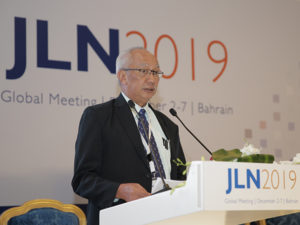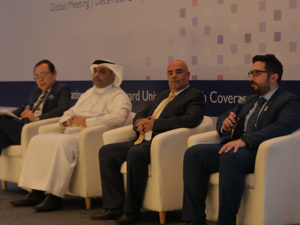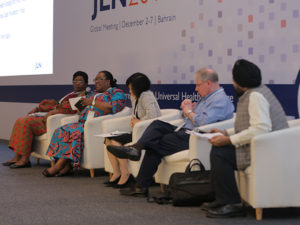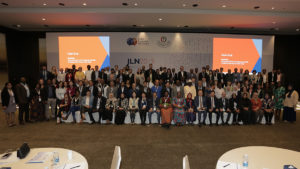Recap: the 2019 JLN Global Meeting
Click here to download the 2019 JLN Global Meeting Report (.PDF)
It has been more than three years since the Joint Learning Network for Universal Health Coverage (JLN) organized a network-wide meeting, the 2016 Global Meeting hosted by Malaysia in July 2016. Since then, the network has evolved with new members joining and transitioning to full membership, growing global support for universal health coverage (UHC) reforms, and a new JLN strategy having been launched. With these changes and new learning priorities, the timing was right to bring network members and partners together.
The Kingdom of Bahrain graciously hosted attendees from more than 30 countries for 6 days of workshops and meetings under the theme of “Drawing on the JLN’s 10 years of knowledge to act on UHC commitments.” The week proved to have a full program, providing attendees opportunities to celebrate the network’s history and accomplishments, explore recent technical work and potentially new learning activities, reflect on changes in the network’s structures and operations, and introduce new partners to the JLN. The final two days were reserved for the JLN Steering Group’s annual in-person meeting.
- December 2: Domestic Resource Mobilization collaborative meeting
- December 3: Domestic Resource Mobilization collaborative meeting
- December 4: Global Meeting Day 1
- December 5: Global Meeting Day 2
- December 6: In-Person Steering Group meeting
- December 7: In-Person Steering Group meeting

Ir. Tubagus Achmad Choesni, Chairperson of Dewan Jaminan Sosial Nasional, gives a keynote address at the 2019 JLN Global Meeting. Photo: Photic Studio
On December 4, Ir. Tubagus Achmad Choesni, Chairperson of Dewan Jaminan Sosial Nasional (DJSN) in Indonesia, provided keynote remarks on the country’s UHC reforms and the experience of expanding health insurance coverage to more than 200 million people. While Indonesia has made progress on implementing UHC, he noted that there are still challenges to overcome and that the country should still work to learn from best practices, that it will be important to adapt lessons “for the best fits… a direct copy and paste of knowledge will not be successful or sustainable.”
Later that day, attendees broke out into mini-learning exchanges on four topics to explore critical health system topics that may be underserved by the network’s current technical agenda:
- Effective and efficient strategies to manage the noncommunicable disease epidemic
- Medicines and UHC
- Reimagining primary health care
- Quality improvement
These sessions allowed participants to select a topic aligned with their own interests and to discuss the topics in greater detail than possible in a plenary session.
On December 5, Mr. Jongsu Ryu, Commissioner of the Korea Health Insurance Review & Assessment Service, moderated a discussion about Bahrain’s health systems and UHC reforms with Dr. Waleed Khalifa Al Manea, Undersecretary at the Ministry of Health; Ebrahim Al Nawaktha, Secretary General of the Supreme Council of Health (SCH); and Dr. Mohamed Al-Shaaban, Chief of Health Policies and Programs at the SCH.

Discussants during the plenary on Bahrain’s UHC and health system reforms. From L to R: John Ryu, Dr. Waleed Khalifa Al Manea, Ebrahim Al Nawaktha, and Dr. Mohamed Al-Shaaban. Photo: Photic Studio
Each of the speakers shared insight into the challenges and progress that Bahrain has made in transforming the health system, particularly the importance of effectively engaging stakeholders as a driver of successful reforms. With feedback coming from all directions, including patients, providers, government agencies, and the private sector, the SCH must remain responsive and iterate to continue to drive progress.
A discussion later on December 5 highlighted the experiences of other JLN member countries, including Ghana, India, Nigeria, and Vietnam, and provided opportunities for interaction with audience members.
In response to a question from the audience about health insurance membership, Modupe Ogundimu, a General Manager in Nigeria’s National Health Insurance Scheme and Convener of the JLN Steering Group, emphasized that, “national health insurance has to be mandatory… voluntary health insurance will not achieve UHC.”
“It is key to have it passed as an act of Parliament,” she continued, “this helps with the growth of the pool and helps ensure the scheme offers more benefits.”

Discussants during the plenary on country UHC reforms. From L to R: Modupe Ogundimu, Dr. Lydia Dsane-Selby, Dr. Phuong Khanh Nguyen, Stefan Nachuk, and Dr. Somil Nagpal. Photo: Photic Studio
Dr. Lydia Dsane-Selby, Chief Executive of Ghana’s National Health Insurance Authority and a Co-Convener of the JLN Steering Group, added that, “Law makes it (mandatory coverage) a reality; however, there are a lot of laws that are not rolled out. Trying to attach health insurance to other things can make it easier to enforce. We can seek out employers who do not provide health insurance. We (Ghana) have a large informal sector, so we have to find a way to tie health insurance to something that they have or want, and we have to make renewals easier.”
The final two days were reserved for the JLN Steering Group’s annual in-person meeting. The Global Meeting gave Steering Group members much to reflect upon as they reviewed the network’s priorities and strategic direction, with a particularly engaged discussion on the four breakout session topics and their alignment with the network’s technical agenda. As 2019 draws to a close, the network has many achievements to reflect on and celebrate.

